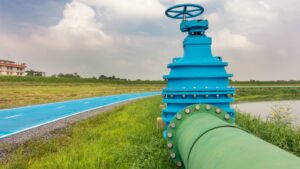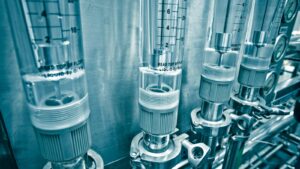Australia has been witnessing many of the mega construction projects if we look into the country’s history. Every government gives massive weight to the necessity of upgrading the country’s infrastructure, understanding its potential to become a giant in the world. This is how the construction industry in Australia scales up every year with high enthusiasm. However, it is not easy to build up these large infrastructures like roads, highways, bridges, etc. It is rather challenging to maintain them stepping against the time. This is where routine maintenance receives attention in the construction fraternity in Australia.
In this article, we explore the importance of routine maintenance for the construction industry in Australia.
In this article, we explore the importance of routine maintenance for the construction industry in Australia.
Why is Routine Maintenance Important for Construction?
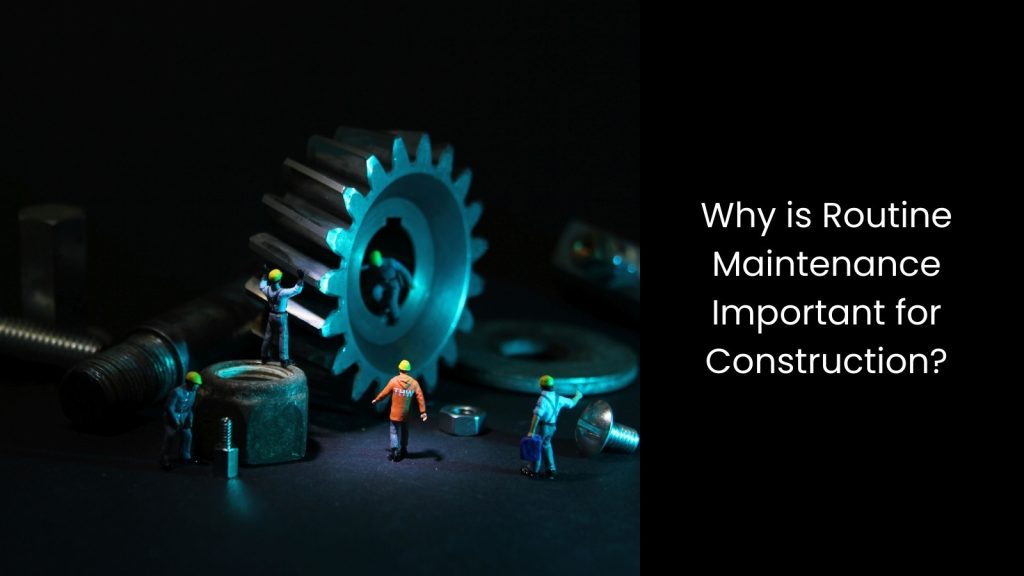
- In the world of construction, there is a buzz around routine maintenance. Let us explain why it is so necessary.
- This actually involves regularly checking and servicing equipment, machinery, and structures to ensure they are in good working condition. That is the general objective of conducting routine maintenance.
- This can include inspecting tools, lubricating moving parts, replacing worn-out components, and ensuring that safety systems are functioning properly. Routine maintenance is essential because it keeps equipment safe, reliable, and efficient, which helps prevent accidents and costly breakdowns.
- Without regular maintenance, equipment can fail unexpectedly. This will lead to delays, increased costs, and even accidents.
- For example, a crane that is not maintained might break down during use, posing serious risks to workers and potentially damaging materials. Plus, regular maintenance helps extend the life of the equipment. In a way, it helps save money in the long run by reducing the need for expensive replacements.
- Not to mention that it also ensures compliance with safety regulations. As you can see, routine maintenance is an outstanding precaution to avoid legal issues and fines.
- Therefore, it has walked from the options list to the necessities list in the construction world.
The Top 5 Reasons to Perform Routine Maintenance in the Construction Industry
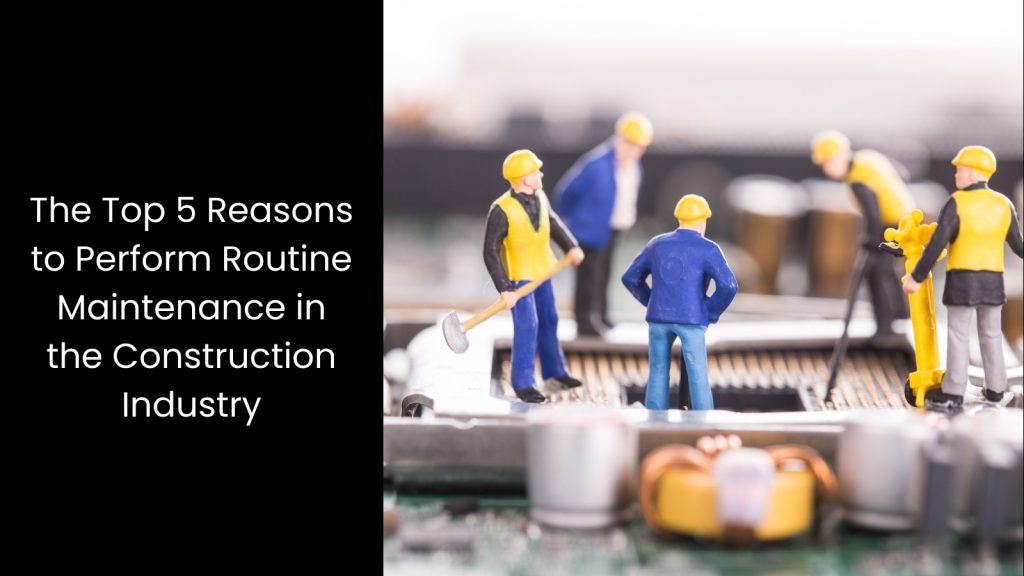
Improved Quality of Work
Performing routine maintenance in the construction industry in Australia seems to improve the quality of work as it ensures that all tools and machinery are always in optimal condition.
Consistent maintenance helps maintain the precision and functionality of tools and machinery. The latter contributes to higher-quality work and better project outcomes.
Let us explain this by giving an example. When equipment like drills and saws are regularly checked and serviced, they perform with greater accuracy and efficiency. This leads to precise cuts and measurements.
As you can see, this sort of precision is crucial in construction. That is specifically because even minor errors can lead to significant problems. On the other hand, well-maintained machinery is less likely to break down or cause delays, ensuring that projects stay on schedule and within budget.
Regular maintenance also helps identify potential issues before they become major problems, preventing costly repairs and extending the lifespan of equipment. This proactive approach means that workers can rely on their tools and machinery to perform correctly, enhancing the overall productivity of the project. It ensures that the final construction meets high-quality standards.
Consistent maintenance helps maintain the precision and functionality of tools and machinery. The latter contributes to higher-quality work and better project outcomes.
Let us explain this by giving an example. When equipment like drills and saws are regularly checked and serviced, they perform with greater accuracy and efficiency. This leads to precise cuts and measurements.
As you can see, this sort of precision is crucial in construction. That is specifically because even minor errors can lead to significant problems. On the other hand, well-maintained machinery is less likely to break down or cause delays, ensuring that projects stay on schedule and within budget.
Regular maintenance also helps identify potential issues before they become major problems, preventing costly repairs and extending the lifespan of equipment. This proactive approach means that workers can rely on their tools and machinery to perform correctly, enhancing the overall productivity of the project. It ensures that the final construction meets high-quality standards.
Safety Enhancement
Regular maintenance ensures that equipment and structures remain in safe working condition. This is important as it paves the way for the authorities to reduce the risk of accidents and injuries on the job site.
For example, if a crane is regularly inspected and any worn-out cables or faulty parts are replaced, the chances of it malfunctioning and causing an accident are significantly reduced. Similarly, maintaining scaffolding and ladders ensures they are stable and secure, preventing falls. These are just a few examples.
So, the point here is that by checking and servicing machineries like excavators and bulldozers, we can prevent unexpected breakdowns that could put workers at risk. Routine maintenance also involves testing safety features like emergency brakes and warning signals to make sure they work properly.
This level of precaution plan is a good approach to identifying potential hazards before they lead to accidents and protecting workers from accidents.
For example, if a crane is regularly inspected and any worn-out cables or faulty parts are replaced, the chances of it malfunctioning and causing an accident are significantly reduced. Similarly, maintaining scaffolding and ladders ensures they are stable and secure, preventing falls. These are just a few examples.
So, the point here is that by checking and servicing machineries like excavators and bulldozers, we can prevent unexpected breakdowns that could put workers at risk. Routine maintenance also involves testing safety features like emergency brakes and warning signals to make sure they work properly.
This level of precaution plan is a good approach to identifying potential hazards before they lead to accidents and protecting workers from accidents.
Extended Equipment Lifespan
This approach helps extend the life of construction equipment and machinery, which are not that inexpensive at all. There are so many working hours, human labour, and money under these large infrastructures. Therefore, it must last long enough to make the most of it. When routine maintenance is done, the authorities can ensure these elements operate efficiently and effectively for longer periods.
When they regularly check and service machines like bulldozers, cranes, and cement mixers, they can catch and fix small issues before they turn into major problems.
For instance, take machinery that has high friction over time. Lubricating moving parts of it reduces wear and tear, preventing it from wearing out quickly. In a similar manner, replacing worn-out parts and tightening loose bolts paves the way for you to avoid bigger, more expensive repairs down the line.
This not only saves money but also ensures that the equipment is available and reliable when needed. Also, regular maintenance keeps equipment performing at its best, which means it works more efficiently and uses less fuel or energy.
When they regularly check and service machines like bulldozers, cranes, and cement mixers, they can catch and fix small issues before they turn into major problems.
For instance, take machinery that has high friction over time. Lubricating moving parts of it reduces wear and tear, preventing it from wearing out quickly. In a similar manner, replacing worn-out parts and tightening loose bolts paves the way for you to avoid bigger, more expensive repairs down the line.
This not only saves money but also ensures that the equipment is available and reliable when needed. Also, regular maintenance keeps equipment performing at its best, which means it works more efficiently and uses less fuel or energy.
Cost Efficiency
Routine maintenance, when associated with concepts like ‘Preventive Maintenance’ can identify and address issues before they become major problems. It will support and save significant costs associated with emergency repairs and equipment replacement.
When regular checking and servicing of machinery is performed, it will reveal small problems, like worn-out belts or leaky hydraulic lines, which can be fixed inexpensively. If these minor issues are ignored, they can lead to major breakdowns that require costly repairs or even complete replacement of the equipment.
In one way, emergency repairs often involve downtime, which can delay construction projects and increase labour costs as workers wait for repairs to be completed. In another way, regular maintenance also helps machinery run more efficiently, reducing fuel and energy consumption. This has another positive impact, as it further cuts operating costs.
Therefore, as you can see, it is not a waste to perform routine checkups of the construction projects and infrastructure in Australia. When they invest in routine maintenance, construction companies can avoid the high costs of unexpected failures and keep their equipment in optimal condition, ensuring that projects stay on budget and on schedule.
When regular checking and servicing of machinery is performed, it will reveal small problems, like worn-out belts or leaky hydraulic lines, which can be fixed inexpensively. If these minor issues are ignored, they can lead to major breakdowns that require costly repairs or even complete replacement of the equipment.
In one way, emergency repairs often involve downtime, which can delay construction projects and increase labour costs as workers wait for repairs to be completed. In another way, regular maintenance also helps machinery run more efficiently, reducing fuel and energy consumption. This has another positive impact, as it further cuts operating costs.
Therefore, as you can see, it is not a waste to perform routine checkups of the construction projects and infrastructure in Australia. When they invest in routine maintenance, construction companies can avoid the high costs of unexpected failures and keep their equipment in optimal condition, ensuring that projects stay on budget and on schedule.
Increased Productivity
It is common knowledge that well-maintained equipment operates more efficiently and reliably in the construction realm. This will further minimise downtime and maximise productivity on those construction projects.
When construction machinery and tools are regularly checked and serviced, they are less likely to break down unexpectedly. This means that workers can rely on the equipment to function properly throughout the day without interruptions.
If companies maintain their machinery properly, they will perform their tasks without stalling or needing repairs. This will allow the construction work to proceed smoothly. Regular maintenance also ensures that all parts of the machinery are in good working condition, which enhances their performance and speed.
Efficient equipment means that the workers can complete tasks faster and with greater precision. This will reduce the time needed for each job. This efficiency helps keep projects on schedule and prevents costly delays.
When construction machinery and tools are regularly checked and serviced, they are less likely to break down unexpectedly. This means that workers can rely on the equipment to function properly throughout the day without interruptions.
If companies maintain their machinery properly, they will perform their tasks without stalling or needing repairs. This will allow the construction work to proceed smoothly. Regular maintenance also ensures that all parts of the machinery are in good working condition, which enhances their performance and speed.
Efficient equipment means that the workers can complete tasks faster and with greater precision. This will reduce the time needed for each job. This efficiency helps keep projects on schedule and prevents costly delays.
Making Routine Maintenance Easy with New Technology
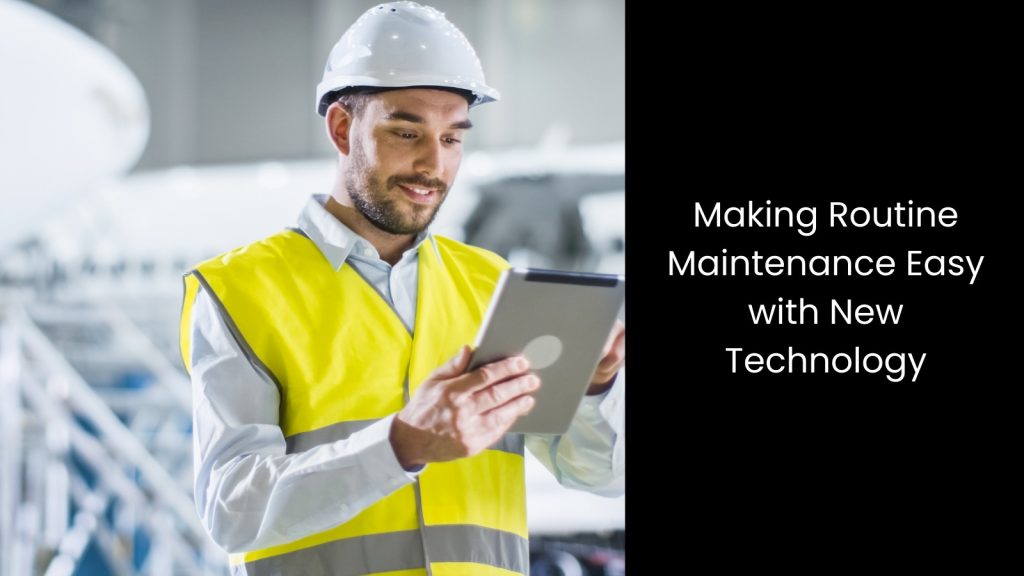
It is quite obvious that routine maintenance is necessary for any country when it comes to construction. However, it is also possible that this can take a long time and waste money when they try to perform it manually. This is why suitable technologies need to be implemented to make routine maintenance easy. Collaborating with an industry expert will be the best way to make this happen.


